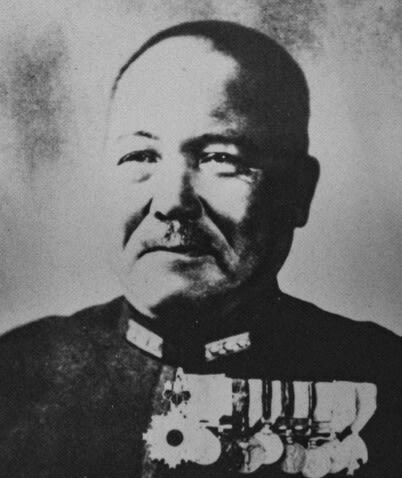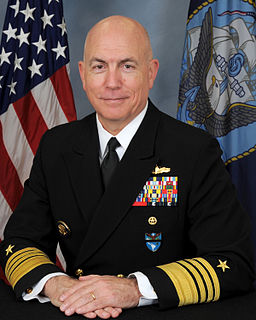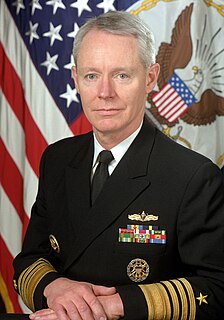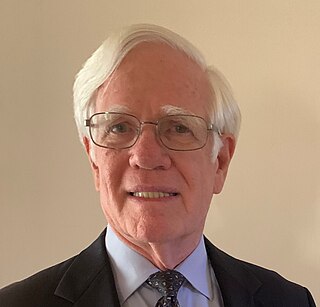Related Research Articles

Vernon E. Clark is a retired admiral who served as the Chief of Naval Operations (CNO) of the United States Navy. He retired on July 22, 2005, making his tenure of five years the second-longest serving CNO behind Arleigh Burke. He currently sits on the board of directors of Raytheon and SRI International. In November 2009, he was selected along with former Secretary of Veterans Affairs Togo West by Defense Secretary Robert Gates to lead the military investigation into the Fort Hood massacre.

Arleigh Albert Burke was an admiral of the United States Navy who distinguished himself during World War II and the Korean War, and who served as Chief of Naval Operations during the Eisenhower and Kennedy administrations.

John Francis Lehman Jr. is an American private equity investor and writer who served as Secretary of the Navy (1981–1987) in the Ronald Reagan administration where he promoted the creation of a 600-ship Navy. From 2003 to 2004 he was a member of the 9/11 Commission.

Paul Henry Nitze was an American politician who served as United States Deputy Secretary of Defense, U.S. Secretary of the Navy, and Director of Policy Planning for the U.S. State Department. He is best known for being the principal author of NSC 68 and the co-founder of Team B. He helped shape Cold War defense policy over the course of numerous presidential administrations.

USS Mobile Bay (CG-53) is a Ticonderoga class guided-missile cruiser serving in the United States Navy. She is named for the naval Battle of Mobile Bay during the American Civil War in 1864.

Takeo Takagi was an admiral in the Imperial Japanese Navy during World War II.

James Lemuel Holloway III was a United States Navy admiral and naval aviator who was decorated for his actions during World War II, the Korean War, and the Vietnam War. After the Vietnam War, he was posted to The Pentagon, where he established the Navy's Nuclear Powered Carrier Program. He served as Chief of Naval Operations from 1974 until 1978. After retiring from the Navy, Holloway served as President of the Naval Historical Foundation from 1980–1998 and served another ten years as its chairman until his retirement in 2008 when he became chairman emeritus. He was the author of Aircraft Carriers at War: A Personal Retrospective of Korea, Vietnam, and the Soviet Confrontation published in 2007 by the Naval Institute Press.

Charles Samuel Hamilton is an award-winning rear admiral in the United States Navy.

Rear Admiral Draper Laurence Kauffman was an American underwater demolition expert, who served during the 1960s as 44th Superintendent of the United States Naval Academy. During World War II, he organized the first U.S. Navy Combat Demolition Units from which the SEALs would evolve. His wartime service also included participation in the invasions of Saipan, Tinian, Iwo Jima, and Okinawa.

Kurt Walter Tidd is a retired United States Navy admiral. He last served as the Commander, United States Southern Command. Prior to that assignment, Tidd served as Assistant to the Chairman of the Joint Chiefs of Staff. He also served as the Director for Operations, Joint Staff (J-3) from 2012 to 2013, and as Commander, United States Naval Forces Southern Command and United States Fourth Fleet from August 5, 2011 to June 22, 2012. Confirmed by the Senate on December 16, 2015, Tidd received his fourth star and succeeded John F. Kelly as commander of United States Southern Command on January 14, 2016. Tidd holds the title of "Old salt", which means he received his qualification for Surface Warfare before any other active-duty navy officer. Upon the May 30, 2018, retirement of his United States Naval Academy classmate, Admiral Harry B. Harris Jr., Tidd also gained the honorific of "Old Goat" – the longest-serving Naval Academy graduate on active duty. Harris presented Tidd with the Old Goat decanter in a ceremony on April 11, 2018.

Admiral Harold W. Gehman Jr. is a retired United States Navy four-star admiral who served as NATO's Supreme Allied Commander, Atlantic (SACLANT), Commander-in-Chief of the United States Joint Forces Command, one of the United States' Unified Combatant Commands, and Vice Chief of Naval Operations. He was also the Co-Chairman of the Commission that investigated the terrorist attack on the USS Cole and was Chairman of the Columbia Accident Investigation Board (CAIB) after the Space Shuttle Columbia disintegrated during reentry in 2003, killing all seven crew members.

Donald Lee Pilling was a retired four-star United States Navy admiral who served as Vice Chief of Naval Operations from 1997 to 2000.

Admiral Robert Joseph Natter is a retired United States Navy admiral who served as Commander, U.S. Atlantic Fleet/Fleet Forces Command from 2000 to 2003.

The Momo-class destroyers were a class of four destroyers of the Imperial Japanese Navy. As with the previous Kaba class, all were named after trees.

James Robert Hogg is a retired United States Navy four star admiral who served as U.S. Military Representative to the NATO Military Committee (USMILREP) from 1988 to 1991.

Derwood Clayiborne Curtis is a retired vice admiral in the United States Navy who served as the Commander, Naval Surface Forces and concurrently Commander, Naval Surface Force, U.S. Pacific Fleet from February 2008 to June 2011.

Lee Fredric Gunn is a retired Vice Admiral and former Naval Inspector General of the United States Department of the Navy.
Winslow T. Wheeler is the Director of the Straus Military Reform Project of the Project On Government Oversight in the Washington, D.C. area. He has authored two books: The Wastrels of Defense: How Congress Sabotages National Security and Military Reform: An Uneven History and an Uncertain Future. He is also the editor of two anthologies, The Pentagon Labyrinth: 10 Short Essays to Help You Through It and America’s Defense Meltdown: Military Reform for President Obama and the New Congress.

Philip Scot Davidson is a four-star admiral in the United States Navy who currently serves as the 25th commander of United States Indo-Pacific Command since May 30, 2018. He previously served as the commander of United States Fleet Forces Command and United States Naval Forces Northern Command from 2014 to 2018. Davidson is from St. Louis, Missouri, and is a 1982 graduate of the United States Naval Academy.

Linton Wells II is an American public servant and educator who served a total of 51 years in government service. He served 26 years in the United States Navy as an officer, and then was appointed by the President of the United States as the Principal Deputy Assistant Secretary of Defense, serving through two administrations of both parties, both the Democrat Bill Clinton and the Republican George W. Bush. He wrote many books, articles, and white papers on matters of national security, including important texts related to the use of American military capabilities in global humanitarian operations. His expertise focused on the strategic impacts of technological change and on building resilience to natural and man-made disasters as issues of US national security. He shaped, over five decades of public service, current US Department of Defense directives that link policy and technology with public-private cooperation. His writings significantly altered U.S. and international approaches to civil-military engagement, US policy in global humanitarian assistance, and global public-private partnerships in disaster relief. He has also made fundamental contributions to technical areas that have defined network-enabled military capabilities and cyberspace operations. After retiring from public service, he continued to contribute to the international STAR-TIDES network that he had founded in 2007, a consortium of several thousand global nodes comprising agencies, organizations, institutions and individuals in 40+ countries that promote the free exchange of research results on global issues of human security. As of 2019 he is Executive Advisor to the Center for Resilient and Sustainable Communities (C-RASC) at George Mason University and chairs the Advisory Group of the C4I and Cyber Center there. C-RASC has been working with the People-Centered Internet (PCI) on ways to “put humanity at the center of the Internet” and support a variety of revitalization initiatives. He is also the President and CEO of Global Resilience Strategies and Senior Advisor to Resilient Japan. He was listed by Fortune magazine in 2009 as one of the top 16 "Players of Tech".
References
- ↑ http://www.asiaamerica.org/Board.htm
- ↑ United States Senate elections, 1990
- ↑ http://www.aicfoundation.com/books.htm
- ↑ http://www.uscc.gov/pressreleases/2007/bios/BIOS.htm
- ↑ http://www.americaneconomicalert.org/view_author_bio.asp?Prod_ID=38
- ↑ Associated Press, April 18, 1989
- ↑ Miami Herald, March 20, 1994
- ↑ Hawkins, William R. "Japan Sounds the Alarm on China, Does the U.S. Hear It?" FamilySecurityMatters , 20 December 2010.